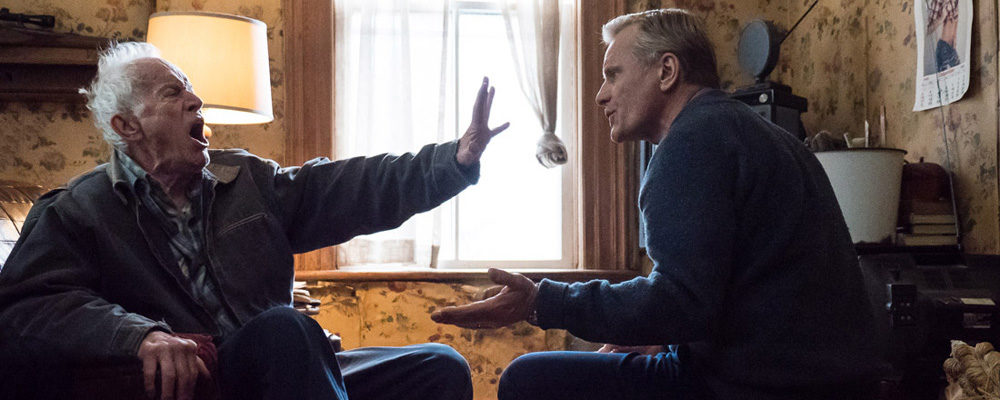‘Falling’ Features Viggo Mortensen and Lance Henriksen in a Heart-Wrenching Standoff
Alci Rengifo
Viggo Mortensen’s “Falling” looks at a life nearing its end with nothing left but rage and memories. Many films have recently focused on the theme of dementia, but none so painfully as this one. It’s a strong directorial debut for Mortensen, who has chosen a very self-contained narrative that allows performance and dialogue to be its strength. In a brilliant stroke of casting he pairs himself with Lance Henriksen, a great actor who became such a fixture for genre pieces that it’s been easy to forget his fierce talent for pure drama. Here he conjures a performance so vivid it becomes frightening to behold.
Mortensen plays John, a gay pilot who resides in California with his husband Eric (Terry Chen) and adopted daughter Monica (Gabby Velis). But when we first meet John he’s stuck on a flight with his aged father, Willis (Henriksen), who lives alone in his upstate New York farm with dementia. Eric is trying to see if Willis would be interested in selling off the farm and finding a new property in California, since it’s obvious he needs closer care. Willis forgets he even proposed the trip and is prone to public eruptions, throwing slurs and violent observations around. At best he can remain calm and lose himself in old memories about his late wife, Gwen (Hannah Gross), and what used to seem like a traditional, rural home in the ‘60s. Truly painful is how Willis’s homophobic bitterness over John tends to jump out in lashing attacks, triggered by any random act or nothing at all.
Mortensen also wrote the screenplay, and even composes the elegiac music score, with help from Buckethead and Skating Polly no less. What he achieves is a delicate film of poetic rhythms and raw emotional expression. In a way the film becomes a reflection on memory versus the now. There isn’t a centralized plot, what Mortensen chooses to focus on is how the Willis we see today is the worn down version of what used to be a rough-edged young man (played in the ‘60s segments by Sverrir Gudnason). Shot in softer tones and wider angles, the flashbacks also defy clichés. Willis was a difficult man, yes, who expected to raise a son to like hunting, handle horses and have his hot-blooded liking for women. He was also a jealous man, unaware that his very attitude would be more culpable if Gwen ever did decide to cheat. Now in his twilight years he rages at these very memories, while judging John for being gay. It’s as if a broken mind now lets loose what’s really inside, from homophobia to racism. Although there is an emotional complexity to the man as well, he may make crass comments while getting Asian food, but never treats his Hispanic granddaughter with anything but tenderness.
This isn’t one of those over-the-top dramas like “The Prince of Tides,” where one man’s emotional scars are then explained by some defining, shocking event in the past. What we see is the gradual experience John had of growing up under the shadow of a man shaped by the prejudices and attitudes of a bygone era. Willis is taken to have lunch with his other offspring, Sarah (Laura Linney), and scoffs at her son’s long and blue-dyed hair. In another memory we see how John was also berated when he was a teenager for growing his hair out. Men like Willis are simply stuck in their ways, and it is made worse when their behavior pattern is to react with brute force to whatever rattles their comfort zone. Yet this man was capable once of even some sensuality. Mortensen evocatively lets Willis interrupt a meal by remembering the sound of a river where he made love to a girlfriend.
All this material is elevated to a powerful emotional level by Mortensen and Henriksen. It’s a rather masterful contrast in personality types. Mortensen’s John is the calmer man who has learned to build emotional shields against Willis, in particular because it’s obvious he genuinely does love his father. But he is gradually building towards a boiling point, because you can only take so much. Henriksen transforms in this role beyond anything he has done before. He has always been an actor of great presence, able to evoke darkness and intelligence in roles like his TV profiler in Chris Carter’s woefully underrated “Millennium.” In “Falling,” he is a rictus of pride and pain. His Willis is beyond stubborn, and it is compounded by a hate towards John’s sexuality, towards anything he doesn’t care to understand and is too old to try. His dementia begins to turn everything into a flowing stew of past and present. Henriksen brilliantly swerves in a single scene from kind to unbearable, loving to scornful.
For many viewers “Falling” will touch on that classic wound of confronting truths about the people who have raised us. For John it means dealing with the final years of a particular kind of American male now reaching the end of the line, still dragging attitudes and memories from a different country, a different place and mindset. We are shaped by our times, but what happens when we’re still stuck there mentally long after our bodies dwindle? Mortensen never allows for an easy resolution here or romantic endings. He wants to say something more truthful in his first feature as a director. This is a special film full of ache and much reflection, about how enclosed minds then become their own prisons.
“Falling” releases Feb. 5 on VOD.

